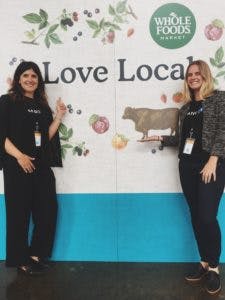
Image by Phil Bond Photography via Whole Foods Market
Whole Foods Market’s Commitment to Local event centered around celebration, education, and innovation in Richmond, CA on October 19th. Executive leadership from Whole Foods Market, tenured suppliers, and industry leaders provided updates regarding the transition to a category management model and discussed the future of the retailer’s local programs. RangeMe Premium members were extended an invitation to this exclusive event alongside current and prospective local suppliers invited by Whole Foods Market. The Commitment to Local event was the first of its kind, and Whole Foods Market aims to host similar events across the country.

Image by Phil Bond Photography via Whole Foods Market
Purchasing Evolution: What to expect?
To improve some of the challenges that local suppliers have faced when working with Whole Foods Market in the past, Whole Foods Market is in the process of transitioning towards a category management model across its eleven regions and furthering their dedication to local suppliers through revamped programs. Local foragers will be on the hunt for new trends and products that represent local communities, while category buyers will continue to use RangeMe to source innovative products online. The category management model will provide suppliers with one contact at the regional level who will guide and assist with incubating the brand and maintaining shelf space. This improvement will streamline supplier growth for those wishing to expand to multiple regions while allowing local teams to focus on customer engagement and the execution of products in-store.
Commitment to GMO Transparency
In an effort to provide transparency for consumers based on the right to know what’s in their food, Whole Foods Market will require all suppliers of food to label products that contain genetically modified risk ingredients by September 1, 2018. Whole Foods Market requires non-GMO claims to be verified by one or more of these three third-party verification programs: USDA Organic (thus non-GMO) or non-GMO (Non-GMO Project Verified or NSF Non-GMO Certified).
Package Labeling
Package details and claims can haunt emerging and veteran suppliers alike. A good rule of thumb is that “less is more,” says Elly Truesdell, Global Product Innovation & Development at Whole Foods Market, “prioritize what you share on your package and keep in mind that you cannot make a claim if it is not verified.” Suppliers shouldn’t get overwhelmed by trying to acquire every applicable claim for their label. When working towards label claims, suppliers are encouraged to focus on acquiring claims that they care and value the most.
Launching & Maintaining Success at Retail
Local items and unique product assortments drive trips to Whole Foods Markets’ brick and mortars and are key factors that retain the retailer’s core shoppers. If you aspire to work with Whole Foods Market to launch or offer a line extension, it’s important to bring a distinct perspective, integrity, and quality to your products. Be prepared and know your market, so you’re able to communicate what differentiates you from your competitors. And once in-store, suppliers can ensure success by providing content for team member training, participating in the revamped demo program, and continuing to offer something new and different for Whole Food Market’s stores.
As always, to get into Whole Foods Markets, “be unique, differentiate the amazing, and don’t be the same,” says Don Clark, Global VP of Purchasing, Non-Perishables. With 25% of in-store shelf space dedicated to local products the opportunities for suppliers to work with Whole Foods Market are thriving. These efficiencies outlined at the Commitment to Local event will be instrumental as Whole Foods Market continues to incubate local brands and lead in trend.
And a big thank you to everyone who stopped by the RangeMe booth and helped make this event a huge success!
Interested in receiving invitations to exclusive events like this? Click here to learn more.
